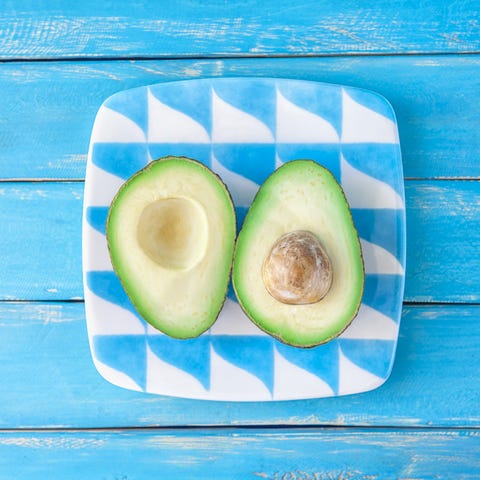You don’t have to look far or hard to find success stories of people who’ve lost weight on the ketogenic diet. Cutting back carbs to 10 percent of calories, or about 20 to 30 grams of carbs a day—that’s about what’s in a medium banana—requires a huge change for most people in how you think about and plan what you eat in a day.
The ketogenic diet’s emphasis on getting 60 to 80 percent of your total calories from fat also will likely require some rethinking. For many people, it’s not only keto’s ratio of macros that help you lose weight. Really thinking carefully about what you eat and planning around it can also help change your weight.
But what if you’re doing everything you think you’re supposed to do to maintain a keto diet and you’re not losing weight? Sometimes, little moves can have a big impact when you’re following a plan like keto. For instance, you may not realize you’re getting more carbs than you expect from certain foods – even a different brand of yogurt can have a different composition of macros than what you’re used to.
The first step if you’re not losing weight on keto is not to get frustrated. The second is to check out these 9 common reasons people don’t lose weight on keto. Little things like eating too many keto sweets, or changing products without looking at the label first can keep your keto efforts from paying off. Check out this list and see if a few little changes can bring back your keto success.
You’re Eating Too Many Calories
On the keto diet, you’re lowering carb intake and eating more fat, which is pretty calorie dense. When you think about the number of calories per gram, it’s 9 calories per gram of fat versus 4 calories per gram of carbs. So, while you’re lowering carb count, you’re probably boosting the calorie count in your diet.
“A ketogenic diet is designed to use fat for fuel … but if you’re consuming too many calories for your needs, it is still possible that you’ll be storing fat just as you would on any dietary pattern,” explains Ginger Hultin, MS, RDN, CSO, spokesperson for the Academy of Nutrition and Dietetics.
A keto diet won’t work if you’re not in a calorie deficit. Before starting any diet, it’s best to meet with a dietitian to determine how many calories you should be eating on a daily basis in order to nourish your body.
You’re Not Really in Ketosis
Unless you’re testing yourself and really tracking your macros on a keto diet app, you could be underestimating the number of carbs you’re eating in the day. Without really analyzing your intake, it’s hard to know whether or not your body is fully in ketosis.
“The carbohydrate intake level is very low; foods like rice, potatoes, bread, starchy veggies, juice, most fruit or sweets of any kind will likely push you over the limit,” Hultin says. It’s easy to lose track—especially when carbs are hiding in seemingly innocuous places. Your best plan of action is to choose foods with very few carbs, like green leafy veggies or berries, when looking for produce.
Plus, it depends on the person: “Everyone is different—what puts one person in ketosis could be different for another person,” she says.
If you’re not losing weight, it might be worth getting some information on your ketogenic state. There are ways to check your ketosis state on your own—to some degree of effectiveness. “They sell testing strips for urine, though those can get false reads for a number of reasons, like hydration levels,” Hultin warns.
“The best way to know if you’re actually in ketosis is through a blood test,” she says. It’s invasive and best done in partnership with a physician. Talk with him or her to see if it makes sense for you to test your blood yourself. If given the green light, “You can buy a blood ketone monitor online and some test strips (usually $30 for the device and $1-$2 per ketone strip),” says Drew Manning, keto expert, personal trainer, and NYT best-selling author.
You’re Stressed Out
You can’t look to your diet alone to help you lose weight. Other hormones can come into play, like cortisol, which spikes when you’re stressed and can cause you to hold onto fat and retain water.
“If anything spikes cortisol levels—chronic work stress, anxiety, lack of sleep, or stress due to a restrictive diet—then yes, that can make it harder for a person to lose weight on any type of diet,” says Hultin. “Cortisol is a fight or flight hormone, so if it’s surging, it can take the body out of a fat-burning state.”
To keep your stress levels low, be sure to prioritize sleep, healthy food choices, and activities that help you mellow out—like exercise, reading, taking a bath or watching a (not too dramatic) movie.
You’re Struggling to Stay on It
Unless you’re intentionally keto cycling, going in and out of ketosis all the time could definitely be hindering your weight loss. Every time you fall out of ketosis, it takes time to get back into fat-burning mode; it’s not an immediate reset.
“No doubt about it, the ketogenic diet is restrictive. It takes time, planning and diligence to stay on it,” Hultin says. “Some people cycle off it by eating more carbohydrates either on purpose or accidentally—which could be a sign that it’s too restrictive for your lifestyle.”
You’re Eating Too Many Keto Sweets
Don’t assume that keto-approved brownie is as healthy as a handful of nuts. While delicious, they are still high in calories, so if you’re treating them as a daily snack or two, you might not lose weight.
“I would recommend people limit keto friendly treats or desserts to only a few times per week,” Manning says. “There isn’t really a best or worst keto dessert; the problem is that they are calorie dense and can trigger more cravings, which can lead to over-consuming.”
Even if it fits in your macros every day, it’s the behavior behind consuming these treats that matters, he says. Eating keto sweets can trick the mind into wanting more indulgent foods.
You’re Not Being Careful With Dairy
Watch out! Sometimes dairy can take you out of ketosis. Certain dairy products like flavored yogurt and 2% milk contain a surprising amount of carbs—the latter has 13 grams in a single cup. And if you’re not the kind of guy to eat yogurt plain, you need to be careful about carbohydrates in the toppings. A seemingly safe yogurt parfait can take you over your carb count for the day. Make sure you check labels before you buy. Carbs can vary between brands, so look carefully before you purchase.
You’re Eating Too Many Restaurant Meals
There’s no denying that restaurant meals are tasty and convenient. However, going out for breakfast, lunch, and dinner can hinder weight loss efforts says Melanie Boehmer, R.D. at Lenox Hill Hospital. That’s because you’re not really sure of every single ingredient a dish contains or how a meal is prepared.
“From a caloric standpoint it’s easier to not know what’s in it,” says Boehmer.
You’re Consuming Too Many Fake Sugars
Keto dieters often rely on artificially sweetened foods and drinks to endure the diet. However, foods marketed as “low” or “no sugar” are easy to overeat because they seem “healthier,” but that isn’t necessarily true.
“They can sill spike blood glucose levels because you’re eating more of them,” she says. Boehmer recommends choose whole, unprocessed foods which will leave you satisfied and provides nutrients.
You’re Drinking Too Much Alcohol
Drinking alcohol temporarily bumps you out of ketosis and stops fat burning dead in its tracks. This means that drinking even two to three alcoholic beverages several times a week may negatively impact your weight loss efforts. If you hit a plateau, it may be time to cut back on happy hour.
You Have an Undiagnosed Medical Condition
Although it’s rare, sometimes people have medical conditions, including food allergies or intolerances, that make weight loss difficult, says Boehmer. Consuming food that you’re either allergic to or intolerant of stresses out your body. This leads to inflammation, which makes it difficult to lose weight, she explains.
Then, there are medical conditions that actually cause you to gain weight. Hypothyroidism, for example, occurs when your body doesn’t create enough of the thyroid hormpone. This can lead to fatigue, weight gain, and muscle aches if left untreated. It may be time to see a doctor if you’re always tired and just can’t lose weight.
Source: Read Full Article






